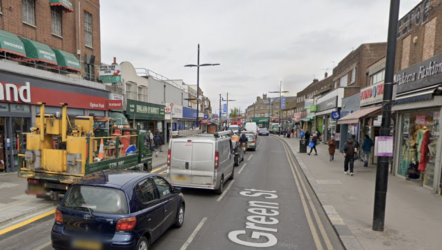For Terry Glasscock, owner of a printing business in south-east London, an ambitious initiative by the UK capital’s mayor to reduce air pollution has clashed with the reality of running a small company in difficult times.
Glasscock will have to pay a daily levy of £12.50 to make deliveries to his customers from Monday, as an expansion of London’s ultra low emission zone, or Ulez, takes effect amid the coronavirus pandemic.
The Ulez, which aims to rid London of older and more polluting vehicles, was originally introduced by mayor Sadiq Khan in 2019 and focused on the city centre.
Any driver of an older and more polluting vehicle has to pay a daily levy of £12.50 to drive inside the Ulez.
From this week the Ulez will expand to almost 20 times its original size to include the area between the north and south circular roads, and will stretch from Tottenham in the north to Brixton in the south, and from Brentford in the west to Barking in the east.
This has prompted many residents living inside the enlarged Ulez, as well as businesses, to upgrade to less polluting vehicles to avoid having the pay the levy, although some have struggled to afford it.
And some businesses located just outside the Ulez must decide whether to replace their vehicles for the same reason.
The Ulez boundary runs through Eltham, where Glasscock’s printing business is based, but while his office is just outside many of his customers are inside.
He said he could not afford to upgrade his diesel delivery van that falls foul of the Ulez rules, and estimated the mayor’s initiative would probably cost his company, which prints everything from large vinyl banners to business cards, an additional £300 a month.
“It’s absolutely disgusting,” said Glasscock. “It’s another tax that I’ll have to pay [just to] deliver around the corner. I’ll have to pass that cost on [to customers].”
The Ulez rules are based on how much nitrogen oxide a vehicle gives out, and affect petrol cars and vans with engines that meet so-called Euro 3 emissions standards, which were sold until about 2006. They also affect diesel vehicles with engines that meet Euro 5 standards, which were sold until about 2015.
Dean Wilson, who runs a small funeral directors in Eltham that falls within the Ulez and has vehicles that comply with its rules, nevertheless expressed concern at the potential impact on his business.
He said the “emotional aspect” of the levy would be amplified when families, who often visit his chapel of rest three to five times before a funeral, are hit with multiple fees.
David Williams, who runs a musical instrument store in Eltham, said the Ulez would hit shopkeepers who were trying to attract customers back to their premises after coronavirus lockdowns.
“The timing is appalling,” he added. “From a shopkeeper’s point of view it is ill conceived.”
Others in Eltham expressed concern that low-paid carers that look after the vulnerable could be hit by the Ulez levy and no longer afford to do their jobs.
The Federation of Small Businesses, a lobby group, has called for the Ulez expansion to be delayed while the economy recovers from the Covid-19 pandemic, and demanded a new scrappage scheme covering lorries and vans to help with the cost of replacing vehicles.
Conservatives on the Greater London Authority have called for the Ulez expansion to be put off until next year.
But Transport for London, the mayor’s transport body that operates the Ulez, said dirty air contributed to thousands of deaths in the capital each year, and highlighted how such pollution had fallen by half in the city centre since 2019.
The body estimated more than 80 per cent of vehicles inside the expanded Ulez would not fall foul of its rules, but there are expected to be 100,000 cars, 35,000 vans and 3,000 lorries that could be hit by the £12.50 daily levy from Monday.
The Ulez appears to have accentuated a public backlash against diesel cars that can be traced back to the Volkswagen emissions scandal in 2015.
The number of diesel cars on the roads of Greater London has fallen 15 per cent since the Ulez was first announced in 2017, six times more than the rest of the UK, according to the Clean Cities Campaign, a coalition of non governmental organisations.
Recommended

At the VW dealership in Hampstead, which will fall within the expanded Ulez, more than half of the inquiries are now for electric vehicles, while three in 10 cars sold at the site run on a battery. The rest are petrol.
“We haven’t sold diesels for over two years,” said Paul Tanner, boss of Alan Day, the dealership group at the site.
Khan is helping less well-off Londoners to dispose of their polluting cars through a £61m scrappage scheme.
He said fixing London’s air required “bold action”, as he encouraged drivers inside the expanded Ulez to make a last-minute check to see whether their cars are compliant with its rules.
“Many more Londoners across the city will enjoy the benefits of cleaner, healthier air,” he added.
Environmental groups and many residents agree, and Khan has faced calls to expand the Ulez further to cover all London boroughs.
Jemima Hartshorn, founder of Mums for Lungs, a clean air group, said the Ulez enlargement was “absolutely necessary”. “But we are nowhere near being able to say air pollution will be sorted,” she added.
https://www.ft.com/content/167d27aa-d7e1-4b6b-b8d2-b657310efe01




